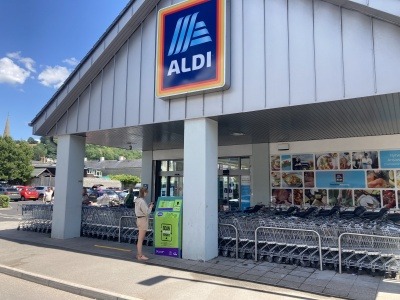Trialling digital deposit return schemes: A solution for glass?
With glass appearing as a recurring issue in the deposit return scheme conversation, the DDRS Alliance thinks it may have a solution in the form of a digital deposit return scheme. The first trial for the scheme is about to begin in Brecon, Wales. Resource Deputy Editor Savannah Coombe spoke to Co-Founder Duncan Midwood ahead of its launch.
 Across the four nations of the United Kingdom, glass is appearing as a central issue in the creation of a deposit return scheme (DRS). The Scottish Government last month decided to delay the start of its DRS due to conflict with Westminster over the inclusion of the material. Stakeholders fear issues associated with logistics, transport costs and health and safety will mean smaller retailers suffer if glass is included, but a digital deposit return scheme (DDRS) may present a solution.
Across the four nations of the United Kingdom, glass is appearing as a central issue in the creation of a deposit return scheme (DRS). The Scottish Government last month decided to delay the start of its DRS due to conflict with Westminster over the inclusion of the material. Stakeholders fear issues associated with logistics, transport costs and health and safety will mean smaller retailers suffer if glass is included, but a digital deposit return scheme (DDRS) may present a solution.
Or at least, that is the thinking of the DDRS Alliance – a cooperation of companies committed to developing a global blueprint for DDRS that includes Tetra Pak, Valpak and more.
A DDRS allows for a DRS to be run online – usually through an app – rather than requiring customers to return glass items in person. Most stakeholders, like the DDRS Alliance, suggest a hybrid system that allows for multiple return options – both in person and digitally.
Duncan Midwood, CEO of the DDRS Alliance, told Resource: “Digital DRS allows you to have your cake and eat it too as it allows glass to be in the system, but only returnable where it's already collected. And that's what we're doing for the Wales trial.
“We’re hoping we can validate a model that for future rollout means that England could decide not to include glass but Wales could still include it. The only requirement is legislation for the glass industry to uniquely code their containers. It enables each country to make their own choices without de-leveraging the industry.”
Supported by Biffa, WRAP and the Welsh Government, the trial is due to start on 13 July in Brecon, Wales. Picking a location for the venture was no easy task – there were four previous locations ruled out for reasons such as unwilling retailers and population size.
“As soon as the Welsh Government said they were supporting it, I could actually go out and knock on doors and ask for funding,” Midwood added.
“Originally we chose two candidates: Brecon and Welshpool. They had to fit in within the right population size of between 6,000 to 8000 people and the town had to be a long way from any other town because we want most people to buy their drinks locally. We didn't want a situation where there was a big supermarket five miles down the road where everybody went to buy their drinks.”
Preparing to trial a digital deposit return scheme
Brecon was selected and preparations for the trial – the first of its kind as far as the DDRS Alliance is aware – began. Notably, the trial will not be taking an actual deposit from customers but will still allow residents to claim 10p credit on the app – which can also be donated to charity – or 10p in cash if the item is returned over the counter.
The 12-week operation will run across all retailers selling takeaway drinks containers in Brecon – supermarkets, pharmacies, off-licences and more. Midwood is quick to thank the companies who are supporting the trial – including Holland & Barrett, Greggs, Boots and more.
He said: “The reality is that this has been an extraordinary effort by lots of companies who have put their own resources and money into the project. Most of the companies in the Alliance have been working on this at their own cost. As well as the larger retailers such as Co-op, Morrisons and Aldi who aren’t formally a part of the Alliance”
How will the digital deposit return scheme trial work?
The DDRS team will manually apply stickers with individual QR codes compliant with international standards organisation GS1 to every relevant item sold during the trial. In a real-life DRS situation, it is intended that packaging producers will include the code in their packaging design.
Reflecting on the challenges of running a trial of this scale, Midwood noted: “The big compromise in this trial is simulating the serialisation with stickers. And that has then some knock-on implications and compromises.
“One of the biggest ones is that we can't include multipacks, because we can't add stickers to individual products in multipacks for obvious reasons. And because multipacks are out, it pretty much means that most beer and cider are out. And therefore we've decided to exclude alcoholic products altogether.”
There is also the predicted uproar of adding a sticker to a nice bottle of wine and the time period over which consumers drink bottles of spirits to consider. Despite the exclusion of alcoholic beverages, all other glass drink containers are still accepted and will be collected at kerbside only.

To allow for kerbside recycling, all 4,300 households in the trial will be given three larger stickers – one for their mixed recycling bin (aluminium, plastic and cartons), one for their glass recycling bin and one to go in the kitchen. Consumers scan both the larger sticker and the QR code on the item once it is ready to be recycled. Each code on a product is completely unique and can only be scanned once ensuring only one reward can be claimed against each container.
One risk is that consumers will scan the code at the point of purchase or consumption, not at the point of recycling. The team have organised a group to track the frequency of this occurrence by monitoring a small sample size of recycling bins while comparing them to the digital data collected via the app. This will allow the size of the problem to be assessed to inform the creation of a DDRS in the future.
Midwood is very clear on the reasons for the trial: it’s to measure human behaviour and collect data. He explained: “The principle of this trial is we're not trying to adorn it with technology to restrict behaviour, what we're trying to do is keep it as a simple measure of behaviour – measure what happens.
“When we've measured it, we can evaluate whether there's a problem that needs a solution to it.”
As it's the first trial of its kind, the results will be invaluable to stakeholders across the UK and indeed the world. The Alliance plans to run a major regional pilot following the outcome of the Brecon trial. A DDRS could allow for multiple materials to be collected in multiple ways – particularly glass. All eyes are on Wales to find out.








